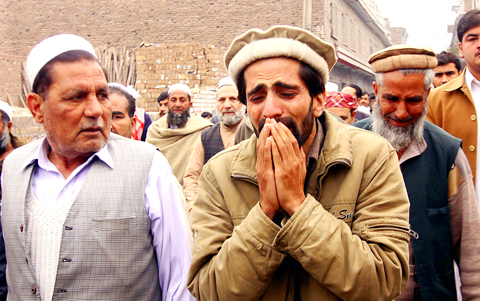US envoy Richard Holbrooke was to meet Afghan President Hamid Karzai yesterday on the second full day of a visit to Afghanistan to assess US-led efforts to tackle a Taliban-led insurgency.
The meeting, scheduled for yesterday evening, comes as Afghanistan marks 20 years since the withdrawal of Soviet forces after a 10-year resistance that the Taliban says has parallels with its own battle against US and other troops.
Karzai’s office would not comment on the agenda, but the president is likely to reiterate demands for an end to civilian casualties in US-led military operations and more focus on militant bases in neighboring Pakistan.

PHOTO: AP
Afghanistan has been heartened by recent strikes on extremist sanctuaries in the Pakistani tribal belt, which it says give vital support to the insurgency.
Holbrooke, US President Barack Obama’s regional troubleshooter, arrived in Afghanistan late on Thursday from Pakistan, where military commanders say they urgently need equipment to tackle the Taliban threat.
NEW US POLICY
He has already met Afghan authorities and politicians including from the opposition, military commanders and international ambassadors as part of wide-ranging discussions that will inform a new US policy in the region.
The envoy, who has a reputation as a hard-nosed diplomat, has insisted a new approach is required to turn the strife-torn country around that involves all of Afghanistan’s neighbors — and in particular Pakistan.
“It is going to be a long, difficult struggle,” he said at an international conference in Germany last week, adding he believed it was going to be “much tougher than Iraq.”
Holbrooke’s appointment underscores Obama’s commitment to refocus on Afghanistan, which last year suffered its deadliest year in the insurgency led by the Taliban who were removed from government in a US-led invasion in late 2001.
ADDITIONAL TROOPS
Obama is expected to decide soon whether to send more US troops to Afghanistan with the US commander here, General David McKiernan, requesting up to 30,000 additional troops.
If they are approved for deployment, it would nearly double the size of the US force, which currently numbers around 37,000.
The expected deployment is seen as one reason behind a delay in presidential elections to August with fears that the weakening security could jeopardize the poll.
Karzai is standing for re-election at the ballot — the second-ever presidential vote in war-battered Afghanistan — amid doubts over his relations with the new US administration after firm support from the previous government.
He said last week that there was some “light wrestling” with his US allies, mainly over civilian casualties, which have caused deep anger and resentment among Afghans and risk public support for his government.
The Taliban often try to use such casualties to fuel suspicion of the troops, whom they call “infidels” and “invaders” like the Soviets who entered Afghanistan in December 1979.
The arrival of the Red Army led to a resistance by mujahidin (holy fighters) that drew in Pakistan and the US and resulted in a Soviet withdrawal on Feb. 15, 1989, which was marked with a public holiday in Afghanistan yesterday.
The Taliban says it too is involved in a jihad and regularly warns of a similar “cruel defeat” for the thousands of US and NATO-led troops who are in Afghanistan at the request of the government.

BACKLASH: The National Party quit its decades-long partnership with the Liberal Party after their election loss to center-left Labor, which won a historic third term Australia’s National Party has split from its conservative coalition partner of more than 60 years, the Liberal Party, citing policy differences over renewable energy and after a resounding loss at a national election this month. “Its time to have a break,” Nationals leader David Littleproud told reporters yesterday. The split shows the pressure on Australia’s conservative parties after Prime Minister Anthony Albanese’s center-left Labor party won a historic second term in the May 3 election, powered by a voter backlash against US President Donald Trump’s policies. Under the long-standing partnership in state and federal politics, the Liberal and National coalition had shared power

CONTROVERSY: During the performance of Israel’s entrant Yuval Raphael’s song ‘New Day Will Rise,’ loud whistles were heard and two people tried to get on stage Austria’s JJ yesterday won the Eurovision Song Contest, with his operatic song Wasted Love triumphing at the world’s biggest live music television event. After votes from national juries around Europe and viewers from across the continent and beyond, JJ gave Austria its first victory since bearded drag performer Conchita Wurst’s 2014 triumph. After the nail-biting drama as the votes were revealed running into yesterday morning, Austria finished with 436 points, ahead of Israel — whose participation drew protests — on 357 and Estonia on 356. “Thank you to you, Europe, for making my dreams come true,” 24-year-old countertenor JJ, whose

A documentary whose main subject, 25-year-old photojournalist Fatima Hassouna, was killed in an Israeli airstrike in Gaza weeks before it premiered at Cannes stunned viewers into silence at the festival on Thursday. As the cinema lights came back on, filmmaker Sepideh Farsi held up an image of the young Palestinian woman killed with younger siblings on April 16, and encouraged the audience to stand up and clap to pay tribute. “To kill a child, to kill a photographer is unacceptable,” Farsi said. “There are still children to save. It must be done fast,” the exiled Iranian filmmaker added. With Israel

Africa has established the continent’s first space agency to boost Earth observation and data sharing at a time when a more hostile global context is limiting the availability of climate and weather information. The African Space Agency opened its doors last month under the umbrella of the African Union and is headquartered in Cairo. The new organization, which is still being set up and hiring people in key positions, is to coordinate existing national space programs. It aims to improve the continent’s space infrastructure by launching satellites, setting up weather stations and making sure data can be shared across